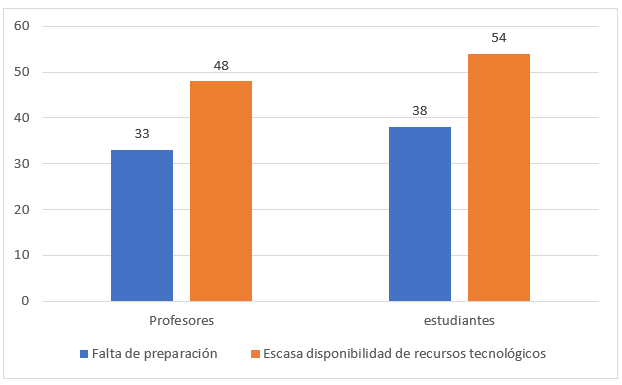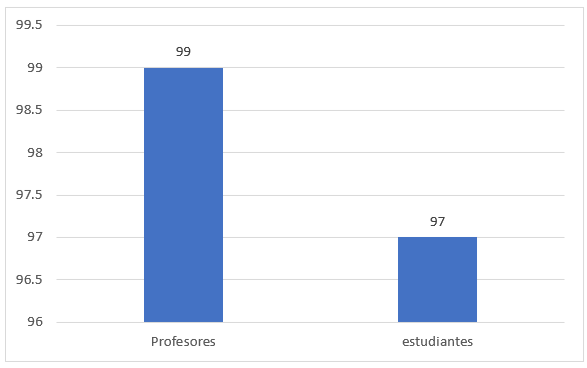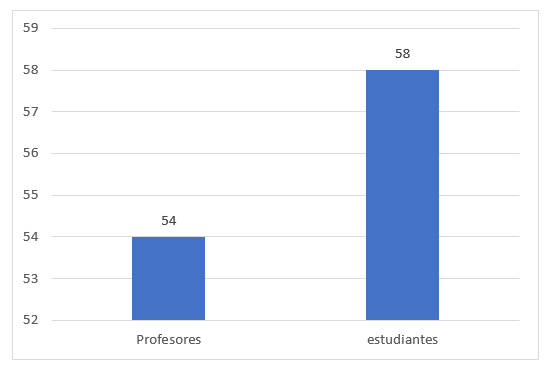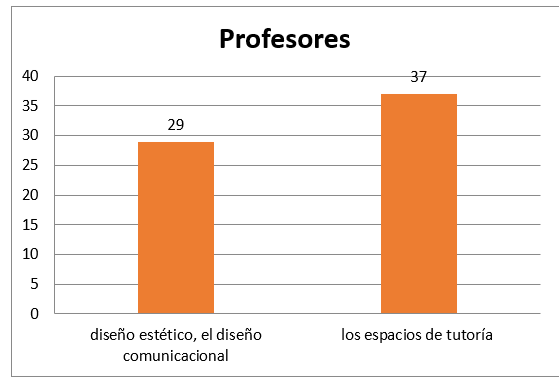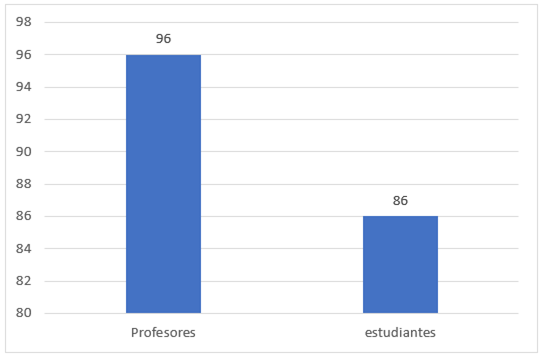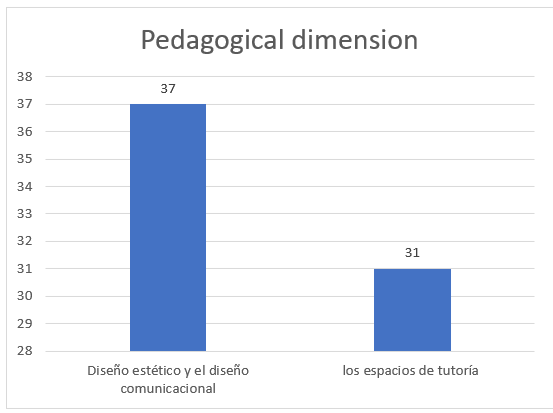My SciELO
Services on Demand
Article
Indicators
-
 Cited by SciELO
Cited by SciELO
Related links
-
 Similars in
SciELO
Similars in
SciELO
Share
Podium. Revista de Ciencia y Tecnología en la Cultura Física
On-line version ISSN 1996-2452
Rev Podium vol.18 no.3 Pinar del Río Sept.-Dec. 2023 Epub Sep 02, 2023
Original article
Initial state of the virtualization of the training process in a University
1Universidad de ciencias de la Cultura Física y el Deporte "Manuel Fajardo". La Habana, Cuba.
2Universidad de Pinar del Río "Hermanos Saiz Montes de Oca". Pinar del Río, Cuba.
The development of Information and Communication Technologies (ICT) generates new social demands on education. In recent years, the use of technological elements in educational contexts has led to profound transformations in institutions and in the way of organizing and working the educational teaching process. The objective of this article was to analyze the initial state of the virtualization of the training process at the Manuel Fajardo University of Physical Culture and Sports Sciences. To achieve this purpose, a set of instruments was applied (surveys to students and teachers, interviews with managers and an observation guide to the courses implemented on the Moodle virtual platform). A mixed approach was assumed that made it possible to search for information on the virtualization of the training process of the "Manuel Fajardo" University of Physical Culture and Sports Sciences (UCCFD in Spanish) from the perspectives of the different actors in the process, which allowed achieving greater fidelity of the results obtained in the applied instruments. The results of the surveys to students and teachers were divided into positive and negative (Shortcomings and Strengths), to highlight the need to develop a virtualization model of the training process of the UCCFD "Manuel Fajardo".
Key words: training process; educational virtualization; dimensions of educational virtualization.
INTRODUCTION
In the current 21st century, there is a marked transformation where a live digital communication is maintained that makes it possible to strengthen digital culture, understood as a technological scenario that promotes learning and knowledge acquisition.
The virtualization of contents currently represents a technological trend due to the increase in online courses that are being implemented in educational institutions at different levels of education. There are more and more Higher Education institutions that offer the benefits of virtual education to respond to the diversity of learning possibilities of their students.
Educational virtualization is structured in three fundamental perspectives or dimensions: pedagogical, technological and organizational, Acosta et al. (2018); which are related to the psycho-pedagogical foundations that those responsible for designing virtual courses will assume, with the identification of which technology is appropriate for the design of the virtual course and the institutional management of educational virtualization.
At the university educational level, different virtual platforms are gaining ground (López et al., 2018; Zambrano et al., 2018; Arancibia et al., 2020), including Moodle. This platform places its focus on an educational process fundamentally supported by interactivity as a teaching-learning strategy, with effective technological support that is integrated with a coherent pedagogical model (Ruiz-Corbella & García-Gutierrez, 2020; Gómez et al., 2021). These platforms constitute a support for teaching and learning allowing the development of the abilities, skills, attitudes and values of the student body through a guiding activity to satisfy the training and training processes in any area of daily, social and academic life.
In Cuba, there is a marked interest in the mediation of learning and skills between the new models of virtual education (e-learning, b-learning, m-learning, etc.), the rethinking of the role of teachers, and the combination of formal and informal learning as trends to achieve great potential in university institutions.
Regarding the virtualization of educational processes in universities, the Strategic Projection proposed by the Ministry of Higher Education (MES) establishes that one of the priority processes is computerization. In this process, training actions must be developed for teachers with the use of ICT, develop and implement a set of resources and tools for the computerization of processes, improve technological management to guarantee the quality and availability of the services and content used (Mejía & Peña, 2019; Luzbet, Laurencio, 2020; González & Batista, 2021).
That is why the training of teachers and students must be given vital importance at the UCCFD, since many perceive a lack related to how to implement this task successfully, an issue that represents an enormous challenge, especially for those linked to the face-to-face teaching (García-Peñalvo et al., 2020).
Regardless of what was previously expressed, an exploratory study was carried out (application of surveys, interviews and observation guides) related to the virtualization of the "Manuel Fajardo" University of Physical Culture and Sports Sciences, in this institution, and the following shortcomings were found:
Insufficient preparation of managers and teachers on the technological, pedagogical and methodological processes related to virtualization, the design of virtual teaching-learning environments and the design of digital educational resources according to the particularities of this career.
Scarce availability and insufficient quality of digital educational resources based on the training process at the university.
Although it is a guideline of the MES to promote the virtualization of training in universities, the UCCFD is beginning this process.
In the didactic design of the virtual teaching-learning environment of the subjects, limitations are shown in the aesthetic and communicational design of the content, in the orientation of individual and collective activities, in the conception of tutoring spaces and in the level of interactivity. and interdisciplinarity.
Marked obsolescence in the institution's technological infrastructure.
Deficiencies in the planning of group activities, which has an impact on the stimulation of collaborative learning.
Insufficiencies in feedback towards the activities that are oriented to the student, both individually and in groups.
The foregoing evidences a contradiction between the current state of virtualization of the "Manuel Fajardo" University of Physical Culture and Sports Sciences, which does not correspond to current social demands, and the desired state of the UCCFD, which aspires to the process of training of the institution has an adequate level of virtualization.
After the analysis carried out previously, this research will aim to analyze the initial state of the virtualization of the training process of the Manuel Fajardo University of Physical Culture and Sports Sciences.
MATERIALS AND METHODS
At the "Manuel Fajardo" University of Physical Culture and Sports Sciences, the Bachelor's degree in Physical Culture is studied with four spheres of professional action: Physical Education, Sport, Recreation, and Prophylactic and Therapeutic Physical Culture.
For the research, the population was made up of 390 teachers, 1840 students who make up the day course from 1st to 4th year because they are the ones who are receiving classes every day and 37 managers whose functions are directly related to the educational teaching process.
In this sense, the research sample was made up of 300 students belonging to 1st and 2nd years, 37 managers who are based on the teaching process and 200 teachers who teach in the selected years.
The instruments that were applied to characterize the dimensions (pedagogical, technological and organizational) of the research at the UCCFD "Manuel Fajardo" were:
Survey: It was applied to 200 professors and 300 students with the objective of obtaining information about the perceptions and knowledge they have about the development of the virtualization process.
Related to the pedagogical dimension, it was desired to know their criteria about the difficulties encountered when incorporating computer tools in the training process; the preparation of teachers, students and managers in the virtual modality; how the use of ICT in the career study plan is evidenced; their assessment of the design of the content, the aesthetic design, the level of interactivity and the guidance given by the teachers on the use of the Moodle virtual platform.
Regarding the technological dimension, the quality of digital educational resources was surveyed; the level in which educational resources favor the students construction knowledge and learning; availability of the technological infrastructure of the network and services provided; the use of resources for group communication, synchronous or not; the use of social networks for communication and collaborative work and the level of importance given to the use of the Moodle virtual platform in the training process.
With respect to the organizational dimension, it was investigated about the teachers' time fund for the design of educational tools; the organization and preparation of multidisciplinary teams for the virtualization of training; instruments for evaluating the quality of virtualization results; the planning, organization and control of the training of students, teachers and managers in the use of ICT; the economic management of the virtualization process at UCCFD and the teachers' time fund for the design of educational resources.
Interview: 37 managers of the institution were asked eight questions with the objective of obtaining information about the importance of implementing a virtualization model of the training process at the UCCFD "Manuel Fajardo".
These questions were focused on knowing if the Bachelor's degree in Physical Culture could be taught in virtual mode; aspects on which the UCCFD should work in order to perfect the ICT integration process; aspects that should be changed to make virtual courses more beneficial; elements that a virtualization model should have to be applied in the degree, difficulties that exist for the introduction of virtualization in the UCCFD and if they considered it important to design a virtualization model of the institution's training process.
Scientific observation: An unstructured participatory observation was carried out, of the courses that are implemented in the Moodle virtual platform of the Manuel Fajardo UCCFD, attending to a set of indicators belonging to the pedagogical and technological dimensions.
These indicators were related to observing the didactic design of the training activities developed in the virtual modality; forms of evaluation of the courses mounted on the virtual platform; orientation level of individual and collective activities; design, development, quality and use of digital resources; design, development and use of resources for synchronous and asynchronous group communication
RESULTS
Survey of students and teachers
The results of the surveys of students and teachers are presented below, highlighting the positive and negative aspects of both questionnaires. All the quantitative and qualitative results of the diagnosis can be observed, due to their relevance the following stand out:
Related to the difficulties encountered when incorporating computer tools in the teaching process, the criteria were fundamentally aimed at the lack of preparation expressed by 38 % of the students and 33 % of the teachers and the scarce availability of resources expressed by the 54 % of the students and 48 % of the teachers (Figure 1).
With respect to whether they knew of the existence of any antecedent of elaboration of a virtualization model for the Bachelor's degree in Physical Culture, 99 % of the professors and 97 % of the students said that they were NOT aware of an antecedent in the UCCFD on this issue (Figure 2).
Positive results
With the application of the instruments, not only deficiencies were detected, but also strengths identified below:
In the question related to the aesthetic design, the communicational design, the teachers considered that it was Adequate for 29 % and with respect to the tutorial spaces, it is Very Adequate with 37 %.
Regarding the level of importance that is given to the use of the Moodle virtual platform in the training process, 54 % of the teachers expressed it is Quite Adequate and 58 % of the students that it is Adequate (Figure 3) and (Figure 4).
Finally, 86 % of the students and 96 % of the teachers consider that it is necessary to develop a virtualization model for the training process of the Manuel Fajardo UCCFD (Figure 5).
In summary, the above data highlights the need for the elaboration of a virtualization model in the distance modality that provides facilities for the production of educational resources that among other aspects:
Takes into account the improvement of all the actors in the process in issues related to the use of ICT.
Takes into account didactic elements that make it possible to develop individual and cooperative learning. It is also a goal that the evaluation of learning allows developing values while maintaining an ethical, positive and responsible attitude; that enables the use of technological tools to develop the skills of the actors in the virtual process and thus increases the quality of the educational process, and, finally, that emphasizes the quality of all the resources, courses, norms, and regulations that they are elaborated
Negative results
Pedagogical dimension
In the survey applied to teachers, they expressed that the preparation of users in the use of the virtual modality and digital educational resources, including aspects related to computer security, is Moderately adequate for 39 %, and the students expressed that they are in the Inadequate category with 45 %.
40 % of the teachers expressed that the evaluation system designed in the virtual courses was Little Adequate and 43 % of the students considered that it was Very Little Adequate.
35 % of the teachers surveyed consider that the study and use of ICT in the study plan of the career is Moderately adequate and 68% of the students consider that it is Very little Adequate (Figure 6).
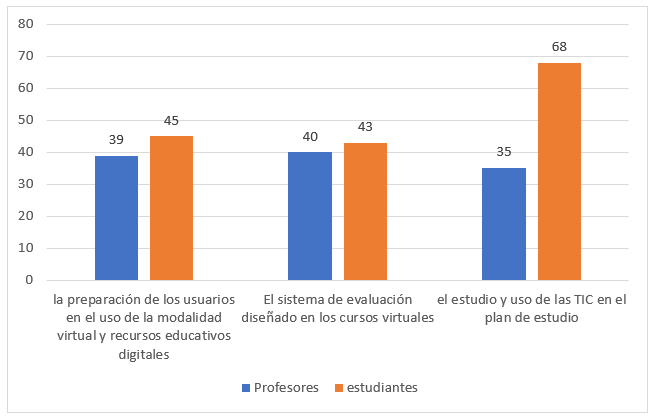
Fig. 6. - Pedagogical dimension. Relationship between the preparation of users, the evaluation system and the study and use of ICTs
In relation to the design of the content, 40 % of the teachers and students expressed that it was Not Adequate and with respect to the level of interactivity, 34 % of the teachers and students considered it to be Moderately Adequate.
In relation to aesthetic design and communication design, 37 % of the students expressed that it was Moderately Adequate and with respect to the tutoring spaces, 31 % expressed that it was Moderately Adequate (Figure 7) and (Figure 8).
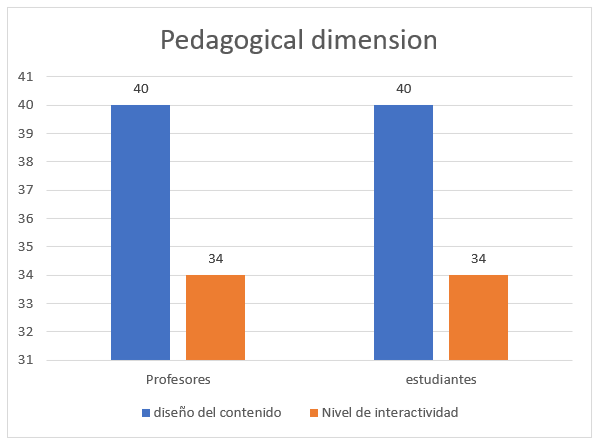
Fig. 7. - Pedagogical dimension. Relationship between Content Design and Level of Interactivity (Teachers/Students)
In the same way, referring to the Level of orientation of the individual and collective activities in the interactive platform, 37 % of the teachers considered that it is Moderately Adequate and 47 % of the students considered that Little Adequate.
Similarly, related to the guidance it provides for students to make effective use of the Moodle Platform, 40 % of the teachers and 37 % of the students expressed that it was Moderately Adequate.
Referring to the orientation that is carried out of the activities and tasks to favor the participation in the course, 46% of the teachers and 55 % of the students expressed that it is Not Adequate.
Technological dimension
In this dimension, insufficiencies related to the quality of the digital educational resources provided for the design and development of training activities were evidenced, since 51% of the teachers considered that it is Little Adequate, and 33 % of the students that it is Very Inappropriate.
The 85 % of the teachers and 88 % of the students expressed that the technological infrastructure of the network and services provided by the UCCFD is Very Inadequate.
Likewise, related to the use of resources for group communication, synchronous or not, in training activities, 43 % of the teachers considered that they were Moderately Adequate and 45 % of the students that Very Little Adequate.
Organizational dimension
In this dimension, with respect to the teachers' time fund for the design of educational resources, 54 % of the teachers consider that it is Very Little Adequate and 31 % of the students that it is Moderately Adequate.
The 31 % of the teachers and 35 % of the students reported that the organization and preparation of the teams in charge of the virtualization of training at the UCCFD is Moderately Adequate.
Related to the planning, organization and control of the training of students, teachers and managers in the use of ICT, 35 % of the teachers considered Little Adequate and 48 % of the students Moderately Adequate.
The economic management of the virtualization process at UCCFD is considered Moderately Adequate by 41 % of the professors and Little Adequate by 48 % of the students.
Interview with managers
An interview was conducted with 37 managers who are in charge of the main substantive processes of the institution. The results of these interviews are explained below:
The first question was related to the fact whether they knew of any experience in the UCCFD of a virtualization model of the degree, for which 100 % said that they did not know of a history of a virtualization model in the Institution.
The second question was focused to knowing their criteria on whether the Physical Culture and Sports Sciences degree can be taught in the virtual modality, for which 81 % considered that it could be done and 19 % considered that it was not, due to the characteristics of the career.
In the third, it was wanted to know what aspects the UCCFD should work on in order to improve the ICT integration process, 37 managers considered that the technological infrastructure should be updated, 33 of them considered that they should work hard to upgrade teachers and train students, 32 consider that new computer services should be implemented and 30 expressed that the use of video should be developed, above all to demonstrate the skills of the profession.
In relation to what aspects should be changed so that virtual courses are more useful in terms of learning achieved, 45 % considered that the forms of evaluation should be changed and 55 % thought that more up-to-date educational resources should be used.
Regarding what elements a virtualization model should have to be applied at the UCCFD, 35 responded that it should be a hybrid model due to the characteristics of the career, and that resources should be developed to assess the professional's skills, 33 considered that they should be implement more innovative and creative educational resources and 30 of them answered that guidelines for enrollment and certification of the virtual courses that are taught should be implemented.
Question six was related to the fact of whether they knew of any digital educational tools, applications or resources that could be used to support the UCCFD processes, 41 % answered affirmatively and 59 % did not know any.
Question seven referred to knowing the difficulties that they considered exist for the introduction of the virtualization process in the UCCFD for which 33 of the respondents considered there is a lack of preparation of teachers to use ICT predominates and 37 considered there is obsolescence of the technological infrastructure.
Finally, they were asked if they considered it is important to design a UCCFD virtualization model, for which 100 % considered that it was very important.
Observation Guide
At UCCFD Manuel Fajardo there is a virtual platform for virtual undergraduate training with a total of 96 courses distributed in the two faculties and another for virtual postgraduate training with a total of 71 courses. In this guide, the proposed indicators were observed in a total of (20) undergraduate and (25) postgraduate courses. Of the 45 courses observed, it was evidenced that related to content design, 6 were evaluated as B (good), 27 as R (fair), and 12 as M (bad). Regarding the level of interactivity, 9 were evaluated as B, 21 as R, and 15 as M. In the aesthetic design, 7 obtained B, 12 R and 26 M. Related to the tutoring spaces, 9 obtained B, 24 R and 12M and with the orientation level of individual and collective activities, 8 were evaluated as B, 26 R and 11 m.
Regarding the forms of evaluation of the courses mounted on the virtual platform, 10 obtained B, 22 R and 13 M. In this same way, related to the quality of digital educational resources, 6 were evaluated B, 11 R and 28 M. Finally, regarding the use of resources for group communication, synchronous and asynchronous, 5 were evaluated from B, 12 from R and 28 from M.
DISCUSSION
As evidenced in the analysis of the results carried out previously, at the UCCFD Manuel Fajardo there is a deficiency related to the implementation of the courses on the virtual platform Moodle. Although the subjects have been implemented, they present difficulties related to the design, structuring, forms of evaluation and use of resources for synchronous and asynchronous group communication.
Other aspects evidenced in the diagnosis that are worth noting is that there is an insufficient preparation of the users related to the introduction of the virtual modality in the educational teaching process, the use and implementation of digital educational resources, the implementation of different forms of evaluation in this modality and ways of guiding the activities.
This is closely related to what was expressed by (García-Peñalvo, et al., 2020; Hernández-Ortega & Álvarez-Herrero, 2021; Escobar-Zúñiga, et al., 2021), where they show that in this modality it must be taken into account the most appropriate educational design to be used in the teaching process, which implies numerous challenges before which teachers perceive a lack of preparation.
Another of the aspects evidenced in the results of the diagnosis is related to the evaluation in the virtual modality, which in itself is a complex issue that represents a significant challenge both in the technological aspect and in the organizational and teaching aspects. A large part of those surveyed do not know what alternatives exist to assess the knowledge that students have in Moodle on the Moodle virtual platform.
For all these reasons, the results obtained in this study are in line with other previous research (Hernández-Ortega and Álvarez-Herrero, 2021). On the other hand, (Varguillas and Bravo 2020; Solís, 2021) express that "the use of information and communication technologies (ICT) not only provides tools, means, resources and content, but, mainly, environments that promote interactions and experiences of interconnection and educational innovation" (p.220), contributing to the comprehensive training of teachers and students.
In the university context, educational processes must be in correspondence with technological innovations, so that teachers are sufficiently trained and updated in the use of ICT. Referring to this, educational institutions according to their cultural, economic, technological particularities, must then assume the necessary educational reforms to achieve the integration of technologies in their substantive processes (Cruz, 2019).
REFERENCIAS BIBLIOGRÁFICAS
Acosta, J. Z., Leyva, A. L., & Licea, M. R. M. (2018). La virtualidad como alternativa de formación universitaria. Didasc@ lia: didáctica y educación, 9(2), pp. 159-178. https://dialnet.unirioja.es/servlet/articulo?codigo=6596592 [ Links ]
Arancibia, M. L., Cabero, J., & Marín, V. (2020). Creencias sobre la enseñanza y uso de las tecnologías de la información y la comunicación (TIC) en docentes de educación superior. Formación Universitaria, 13(3), pp. 89-100. https://www.scielo.cl/scielo.php?script=sci_arttext&pid=S0718-50062020000300089 [ Links ]
Cruz, E. D. C. (2019). Importancia del manejo de competencias tecnológicas en las prácticas docentes de la Universidad Nacional Experimental de la Seguridad (UNES). Revista Educación, 43(1), pp. 196-218. https://doi.org/10.15517/revedu.v43i1.27120 [ Links ]
Escobar-Zúñiga, J. C., Arenas-Martínez, E. C., & Sánchez-Valencia, P. A. (2021). Metodología de evaluación de competencias digitales en estudiantes de maestría con modalidad virtual. Formación universitaria, 14(4), pp. 71-78. https://www.scielo.cl/scielo.php?script=sci_arttext&pid=S0718-50062021000400071 [ Links ]
García-Peñalvo, F. J., Corell, A., Abella-García, V., & Grande, M. (2020). La evaluación online en la educación superior en tiempos de la COVID-19. Education in the Knowledge Society, 21, 1-26. https://doi.org/10.14201/eks.23013 [ Links ]
Gómez, G. Á., Moya, J. V., Ricardo, J. E., & Sánchez, C. V. (2021). La formación continua de los docentes de la educación superior como sustento del modelo pedagógico. Revista Conrado, 17(S1), pp. 431-439. https://conrado.ucf.edu.cu/index.php/conrado/article/view/1800 [ Links ]
González Aportela, O., & Batista Mainegra, A. (2021). Virtualización del proceso extensión universitaria: una emergencia en tiempos de COVID-19. Revista Universidad y Sociedad, 13(5), pp. 213-222. http://scielo.sld.cu/scielo.php?script=sci_abstract&pid=S2218-36202021000500213&lng=es&nrm=iso [ Links ]
Hernández-Ortega, J., & Álvarez-Herrero, J. F. (2021). Gestión educativa del confinamiento por COVID-19: percepción del docente en España. Revista Española de Educación Comparada, 38, pp. 129-150. https://doi.org/10.5944/reec.38.2021.29017 [ Links ]
López Catalán, L., López Catalán, B., & Prieto Jiménez, E. (2018). Tendencias innovadoras en la formación online. La oferta web de postgrados e-learning y blendedlearning. Revista de Medios y Educación, 53, pp. 93-107. https://idus.us.es/handle/11441/85266 [ Links ]
Luzbet Gómez, F. R., & Laurencio Leyva, A. (2020). La virtualización como alternativa para la educación de posgrado. Revista Cubana de Educación Superior, 39(3). http://scielo.sld.cu/scielo.php?script=sci_arttext&pid=S0257-43142020000300017 [ Links ]
Mejía, J., & Peña, M. (2019). Virtualización del proceso educativo en escenarios universitarios: actitud del docente. Facultad de Humanidades y Educación, 15. https://www.researchgate.net/publication/337471974_Virtualizacion_del_proceso_educativo_en_escenarios_universitarios_actitud_del_docente [ Links ]
Ruiz-Corbella, M., & García-Gutiérrez, J. (2020). Aprendizaje-servicio en escenarios digitales de aprendizaje: propuesta innovadora en la educación superior. RIED. Revista Iberoamericana de Educación a Distancia, 23(1). http://dx.doi.org/10.5944/ried.23.1.24391 [ Links ]
Solís, O. B. (2021). Educación virtual interactiva como metodología para la educación: revisión de literatura. In Crescendo, 11(2), 225-238. https://www.researchgate.net/publication/348920249_Educacion_virtual_interactiva_como_metodologia_para_la_educacion_revision_de_literatura [ Links ]
Varguillas, C. S., & Bravo, P. C. (2020). Virtualidad como herramienta de apoyo a la presencialidad: Análisis desde la mirada estudiantil. Revista de Ciencias Sociales (Ve), 26(1), pp. 219-232. https://www.redalyc.org/journal/280/28063104019/28063104019.pdf [ Links ]
Zambrano, J., López, A., Leyva, A., & Quiroz, L. (2019). Formación de postgrado mediada por TIC: un modelo de virtualización para la Universidad Técnica de Manabí, Ecuador. Revista Espacios, 40(33), 27. http://atenas.umcc.cu/index.php/atenas/article/download/110 /177?inline=1 [ Links ]
Received: April 06, 2023; Accepted: July 14, 2023











 text in
text in 

